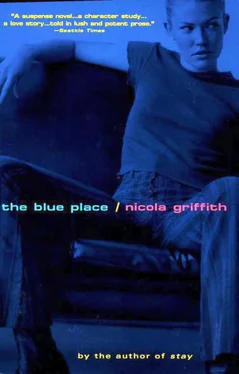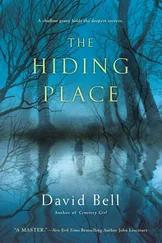nicola griffith
the blue place
An April night in Atlanta between thunderstorms: dark and warm and wet, sidewalks shiny with rain and slick with torn leaves and fallen azalea blossoms. Nearly midnight. I had been walking for over an hour, covering four or five miles. I wasn’t tired. I wasn’t sleepy.
You would think that my bad dreams would be of the first man I had killed, thirteen years ago. Or if not him, then maybe the teenager who had burned to death in front of me because I was too slow to get the man with the match. But no, when I turn out the lights at ten o’clock and can’t keep still, can’t even bear to sit down in my Lake Claire house, it’s because I see again the first body I hadn’t killed.
I was twenty-one, a rookie in a uniform so new it still smelled of harsh chemical dyes. My hat was too big. My partner and I had been called to a duplex on Lavista. It was me who opened the bathroom door.
As soon as I saw that bathwater, I knew. Water just doesn’t get that still if the person sitting in it is alive: the pulse of blood through veins, the constant peristaltic squeeze of alimentary tract, the soft suck of breath move the liquid gently, but definitely. Not this water. It was only after I had stared, fascinated, at the dry scum on the bar of soap, only after my partner had moved me gently aside, that I noticed her mouth was open, her eyeballs a gluey blue-grey where they should have been white.
I wake up at night seeing those eyes.
The sidewalks around Inman Park are made from uneven hexagons, mossy and slippery even without the debris of the recent storm. I walked in the road. A pine tree among the oaks smelled of warm resin, and the steam already rising from the pavement brought with it the scents of oil and rubber and warm asphalt. I smiled. Southern cities. People often say to me, Aud, how can you stand the heat ? but I love it. I love to feel the sun rub up against my pale northern skin, love its fingers reaching down into muscle and bone. I grew up with subzero fjord winds edged with spicules of ice; to breathe deep and feel damp summer heat curling into delicate bronchioles is a luxury I will never tire of. Even during the teenage years I spent in England, when my mother decided the embassy could get along without her for a week or two and we all went up to Yorkshire to stay with Lord Horley, there was that endless biting moan over the moors, the ceaseless waving of heather and gorse. The American South suits me just fine.
Atlanta is lush. The gates and lawns and hedges I walked past were heady with the scents of trumpet honeysuckle and jasmine, the last of the pink and white dogwood blossom. By June, of course, all the small blooms would wilt in the heat, and the city’s true colours, jungle colours, would become apparent: black-striped tiger lilies, orchids, waxy magnolia blossom. By the end of August, even those would give up the ghost and the city would turn green: glossy beryl banana trees with canoe-sized leaves, jade swamp oak, and acre upon emerald acre of bermuda grass. And as the summer heat faded into the end of October, the beginning of November, the green would fade with it. In winter Atlanta became a pale black and white photograph of a city with concrete sidewalks, straw-coloured grass and bare, grey trees.
Thunder rumbled to the southwest and lightning turned the clouds the pink of Florida grapefruits: a long, long wait until winter.
I lengthened my stride, enjoying the metronomic thump of boot on pavement, the noisy sky, and when I took a corner wide walked smack into a woman running in the opposite direction.
We steadied each other for a moment—long enough for me to catch the expensive scent of her dark, rain-wet hair—then stepped back. Looked at each other. About five-seven, I’d say. Slim and sleek. Face smooth with wariness: after all, I’m big; I’m told I look frightening when I want. And that made me think how fragile she was, despite the hard muscle I had felt under my hand. It would be so easy—a step, a smile, swift whirl and grab, and snap: done. I even knew how she would fall, what a tiny sound her last sigh would be, how she would fold onto the pavement. Eight seconds.
She stepped back another pace. It was meant to look casual, but I noted the weight on her back foot, the set of her shoulders. Funny the thoughts we have at nearly midnight. I clasped my hands behind my back in an effort to appear less threatening, then nodded, stepped to one side, and walked away. All without a word spoken. As I moved past the big houses shrouded by dripping trees I fought the urge to look over my shoulder. Looking back would frighten her. I told myself there was nothing unusual about a woman walking the streets at midnight—I did it—but my hindbrain was stirring.
Thunder rumbled again, and water sluiced down in sheets as sudden and cold as spilled milk, beating itself into a froth on the sidewalk. The air was full of water and it was getting difficult to breathe. Lightning streaked down to my left just a bit too close for comfort. I turned for home and started to jog. No sense drowning.
The road jumped under my feet. Transformer, I thought, but then the sound hit, batting at me from both sides like huge cat’s paws. My eyes widened and promptly filled with rain. I shook my head, trying to get rid of the ringing in my ears, but the world jumped again, pavement slamming the soles of my feet, only this time the sound was as solid as a punch in the gut, and this time I recognized it—explosives. Then I was turning and running back to where I had just come from, back to the corner, towards a house unfurling in orange flame and black smoke, a brighter yellow at the center, like a gigantic tiger lily. I skidded to a halt in confusion. It’s too early for lilies….
I stood helpless, face getting hotter and hotter. I lifted my hand to shield my eyes but it didn’t help much. I had to step back a few yards. The flames roared. People began to appear in their doorways. Blinds twitched. I did nothing. Let the neighbours look their fill; if there had been anyone in that house, they were beyond aid, and no doubt someone had called the fire department. Not that there was much point: the fire burned very neat and clean; the neighbours’ houses were safe; I doubted even that the garage would catch.
It was far too good a torch to be the work of an amateur firebug who wouldn’t be able to resist sticking around to watch their work, but I looked anyway. No sign of the woman with the rain-wet hair.
My hindbrain was beginning to stretch and snuff now, so I thought about that woman. What was it about her that put my senses on red alert? She hadn’t done this: most accelerants had very particular scents, difficult to hide, and besides, she had been running towards the house, not away.
Sirens whooped in the distance. The police and firefighters would be all burly and adrenaline-harsh in their uniforms. They wouldn’t want me there, wouldn’t know how to act around me, and tonight I could not be bothered to put them at their ease just so they would call me Lieutenant out loud but wonder silently what I was doing wandering the streets alone at midnight.
The flames were dying quickly, leaving dark images like shrivelling leaves on my retina. I backed into the shadows.
I stripped off my wet clothes and sat cross-legged on the silk rug to rub my hair dry with a towel. Rain beat on the windows. Blood beat in my veins. Turning the corner wide…
It’s a simple thing. If you walk tight around a corner, you can be surprised by anyone who is waiting on the other side. It’s like sitting with your back to the door, like chambering a round and leaving the safety off, wearing a dress that will restrict your legs, or walking with your hands in your pockets: stupid. But so many people do it. Every now and again I go into a school to teach self-defence classes to young women. I ask: How many of you know which way to look before crossing a busy street? And every single hand will go up. So then I ask: Who knows the fire drill? And most of the hands stay up. Even if I ask who knows CPR, or what to do if you smell gas, there are a lot of hands. But if I ask how many know how to walk around a corner properly—or escape a stranglehold, or find out if the man behind you really is following you—they lower their hands in confusion. Yet these are all sensible precautions. It’s just that women are taught to not think about the danger they are often in, or how to prevent it. We’re taught to feel fear, but not what to do about it.
Читать дальше












